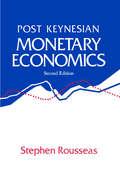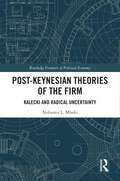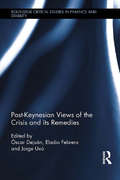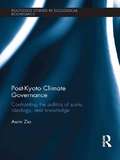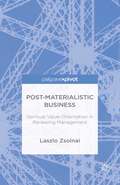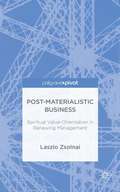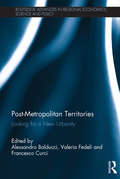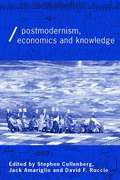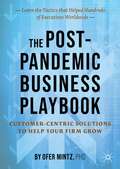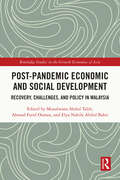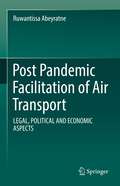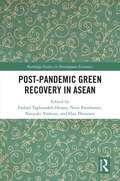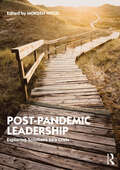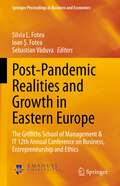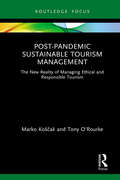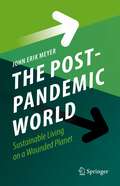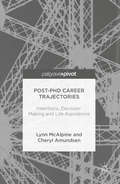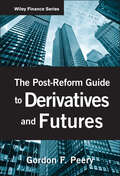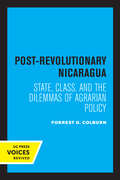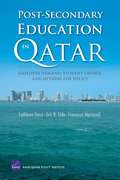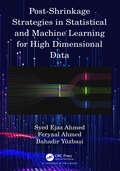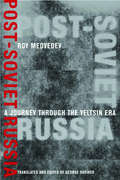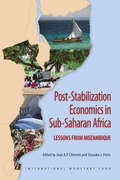- Table View
- List View
Post Keynesian Monetary Economics
by RousseasDuring the past five years, crises in the US savings and loan industry, commercial banks, and other financial institutions have borne out the ideas that Rousseas expressed in the first edition. His main theme stresses the role of innovation in the financial sector of the economy and its implications for control of the money supply and credit, as well as the larger issue of macroeconomic policy. He holds a Post-Keynesian view of an elastic and endogenous money supply that is largely founded on the "general liquidity thesis" of the Radcliffe Committee. Indeed, the elasticity of the credit structure is even greater than the Radcliffe Committee originally claimed. Tables and charts are revised through 1990, and the text has been revised accordingly. An expanded preface to the revised edition makes this book very relevant to contemporary problems and policy.
Post-Keynesian Theories of the Firm: Kalecki and Radical Uncertainty (Routledge Frontiers of Political Economy)
by Nobantu L. MbekiWithin Post-Keynesian economics there is a spectrum of approaches to theories of the firm but what they have in common, to their great benefit, is a proper integration of the concept of radical uncertainty: data that cannot be known. This book revisits Kalecki’s theory of the firm is located to show that it constitutes fertile theoretical ground on which to systematically understand the resultant indeterminacy when firms operate under conditions of radical uncertainty. The author proposes a way of generalising radical uncertainty by integrating some of the separate approaches within Post-Keynesian economics centred around Kalecki’s work. Through this, it is shown that radical uncertainty does more than just change the ultimate motivation of firms (dropping short-run profit maximisation; more complex motivation; interconnectivity with the environment), it is central to the emergence, existence and motivation of firms, and critically also firm strategy. It is argued that firms do not simply respond to uncertainty: it is the systematic cause of their intentional behaviour. Through developing these arguments, the book also contributes to the methodology of Kalecki and Shackle, as well as Kaleckian price theory. This book will be important reading for anyone interested in theories of the firm, Post-Keynesian economics and heterodox approaches to economics more broadly.
Post-Keynesian Views of the Crisis and its Remedies (Routledge Critical Studies in Finance and Stability)
by Óscar Dejuán Eladio Febrero Jorge UxóAt the end of the 20th century, mainstream economics was based on theories which viewed capitalism as a self-regulating system, whereby crises come about due to external shocks and would be automatically corrected by the price mechanism if it was flexible enough. Post-Keynesian economists, however, consider that the business cycle and the crises are endogenously generated. They recommend active policies as a response, though the remedies may be worse than the illness if they are not applied at the right moment and in the right proportions. The first great recession of the 21st century offers post-Keynesian economists an opportunity to prove the realism of their models. It is also a chance to make theoretical improvements, to abandon some hypotheses and to introduce new ones. This book, from a top group of international economists, analyzes the causes, consequences and evolution of the crisis from a variety of post-Keynesian perspectives. It then presents a case for realistic and essential remedies. The book is both theoretical and applied, with a global reach and a particular focus on the European debt crisis.
Post-Kyoto Climate Governance: Confronting the Politics of Scale, Ideology and Knowledge (Routledge Studies in Ecological Economics #27)
by Asim ZiaIn the midst of human-induced global climate change, powerful industrialized nations and rapidly industrializing nations are still heavily dependent on fossil fuels. Even if we arrive at a Hubbert’s peak for oil extraction in the 21st century, the availability of technologically recoverable coal and natural gas will mean that fossil fuels continue to be burned for many years to come, and our civilization will have to deal with the consequences far into the future. Climate change will not discriminate between rich and poor nations, and yet the UN-driven process of negotiating a global climate governance regime has hit serious roadblocks. This book takes a trans-disciplinary perspective to identify the causes of failure in developing an international climate policy regime and lays out a roadmap for developing a post-Kyoto (post-2012) climate governance regime in the light of lessons learned from the Kyoto phase. Three critical policy analytical lenses are used to evaluate the inherent complexity of designing post-Kyoto climate policy: the politics of scale; the politics of ideology; and the politics of knowledge. The politics of scale lens focuses on the theme of temporal and spatial discounting observed in human societies and how it impacts the allocation of environmental commons and natural resources across space and time. The politics of ideology lens focuses on the themes of risk and uncertainty perception in complex, pluralistic human societies. The politics of knowledge lens focuses on the themes of knowledge and power dynamics in terms of governance and policy designs, such as marketization of climate governance observed in the Kyoto institutional regime.
Post-Materialist Business: Spiritual Value-Orientation in Renewing Management
by László ZsolnaiPost-Materialist Business presents a spiritual-based approach to business and management. It uses pluralistic view of spirituality and provides a number of inspiring cases of alternative organizations which go beyond the materialistic mindset of business and serve the common good of society, nature, and future generations.
Post-Materialistic Business: Spiritual Value-Orientation in Renewing Management
by Laszlo ZsolnaiPost-Materialistic Business
Post-Metropolitan Territories: Looking for a New Urbanity (Routledge Advances in Regional Economics, Science and Policy)
by Alessandro Balducci Valeria Fedeli Francesco CurciProcesses of multi-scalar regional urbanization are occurring worldwide. Such processes are clearly distinguishable from those of the nineteenth and twentieth centuries due to the shifting concepts of both the city and the metropolis. International literature highlights how what we have historically associated with the idea of cities has long been subjected to consistent reconfiguration, which involves stressing some of the typical features of the idea of "cityness". Post-Metropolitan Territories: Looking for a New Urbanity is the product of a research project funded by the Italian Ministry for Education, Universities and Research (MIUR). It constitutes a thorough overview of a country that is one of Europe's most diverse in terms of regional development and performance: Italy. This book brings together case studies of a number of Italian cities and their hinterlands and looks at new forms of urbanization, exploring themes of sustainability, industrialization, de-industrialization, governance, city planning and quality of life. This volume will be of great interest to academics and students who study regional development, economic geography and urban studies, as well as civil servants and policymakers in the field of spatial planning, urban policy, territorial policies and governance.
Post-Modernism, Economics and Knowledge
by Stephen Cullenberg Jack Amariglio David F. RuccioOnly in the past twenty years have debates surrounding modernism and postmodernism begun to have an impact on economics. This new way of thinking rejects claims that science and mathematics provide the only models for the structure of economic knowledge.This ground-breaking volume brings together the essays of top theorists including Arjo Klamer, D
The Post-Pandemic Business Playbook: Customer-Centric Solutions to Help Your Firm Grow
by Ofer MintzCOVID-19 forced a dramatic change to customer behavior that resulted in an economic crisis not witnessed by anyone alive. Businesses can no longer operate as before because their customers are no longer operating as before. This book provides customer-centric based guidance for how businesses should adapt to this new reality, deriving insights from academic research, case studies, interviews, and best practice examples from around the world. As validated by hundreds of top-level executives, its readers will gain a better understanding of why customer behavior has changed so they can use the book’s solutions to navigate through and succeed in the post COVID-19 future.
Post-Pandemic Economic and Social Development: Recovery, Challenges, and Policy in Malaysia (Routledge Studies in the Growth Economies of Asia)
by Muzalwana Abdul Talib Ahmad Farid Osman Bahri, Elya Nabila AbdulThis book explores Malaysia’s experience during the COVID-19 pandemic, analyzing the profound economic and societal challenges faced from 2020 to 2022.The coverage of Malaysia’s post-pandemic recovery provides valuable insights into ongoing global issues. Contributors to this book address a wide range of topics, including unemployment, monetary and trade policies, tourism, human capital development, and women’s labor participation. They also examine the rise of the gig economy, poverty alleviation efforts, and social safety nets. By presenting model applications and empirical research, the book offers data-driven policy advice to handle challenges that arise from pandemics, such as rising inflation, supply chain disruptions, disparities and sustainability issues.This book will interest academics and researchers in the field of econometrics, Asian economics and Malaysian studies. It will also act as a useful guide for NGOs, practitioners, public administrators, and economic policymakers involved in post-COVID-19 economic revival and policy development.
Post Pandemic Facilitation of Air Transport: LEGAL, POLITICAL AND ECONOMIC ASPECTS
by Ruwantissa AbeyratneFrom early 2020 for a period of two years at the end of which this book was written, air transport suffered unprecedented setbacks due to the COVID-19 pandemic. Although the pandemic may eventually fizzle out into another flu like occurrence, the restraint with which air transport services were offered would remain with us for a while with some practices being sustained, particularly those pertaining to public health. One of the main areas of air transport that was and will be affected significantly by the changed circumstances - is facilitation – a subject that is regulated by the Chicago Convention of 1944 and its Annex 9. This book looks in depth at the Annex as it will be applied in a post pandemic world, against its legal, socio-political, and economic impacts, addressing the Standards of the Annex on clearance of aircraft; entry and departure of passengers; and the carriage of cargo. It also discusses some critical aviation events in 2020 and 2021 that occurred as they relate to facilitation of air transport. Some of the key areas discussed are the role of ICAO; issues of public health as they relate to air transport; security of travel documents; smuggling of persons; digital technology and rights of the passenger; unruly passengers; carriage of disabled passengers; relief flights and repatriation flights; and facilities at airports.
Post-Pandemic Green Recovery in ASEAN (Routledge Studies in Development Economics)
by Farhad Taghizadeh-Hesary Nisit Panthamit Naoyuki Yoshino Han PhouminASEAN’s real gross domestic product (GDP) had declined sharply due to the COVID-19 pandemic. The economic downturn and the uncertainty about the future reduced the new investments in green projects drastically. Besides this, many governments rolled back environmental regulations and taxes and increased fossil-fuel intensive infrastructure and electricity to stimulate economic growth. Post-Pandemic Green Recovery in ASEAN consists of several empirical studies using fresh data, with regional and country-level perspectives on ways to keep the greenness of the economic recovery plans. The chapters look at various aspects and sectors, including tourism, infrastructure, energy, small and medium enterprises (SMEs), employment, and livelihood, by assessing the effectiveness of various tools and instruments, including green finance, carbon taxation, green Sukuk, credit guarantee, cash transfer payment, power purchase agreements, and the related policies. They also provide practical policy recommendations useful for the ASEAN member states and other developing regions for the green recovery in the post-pandemic. Reiterating the importance of green and low-carbon mechanisms and climate change tackling policies besides the usual economic recovery strategies, this book is a precious resource for the researchers of economics, finance, ASEAN and Asian studies, and policymakers.
Post-Pandemic Leadership: Exploring Solutions to a Crisis
by Morgen WitzelThis book shows readers how to rethink and reimagine leadership and charts a course towards a new vision of leadership. It outlines lessons to be learned for leadership – not only after the COVID pandemic but also in light of other ongoing crises around issues such as climate change and global inequality. The pandemic has shone a harsh spotlight not just on the leaders of organisations but on the concept of leadership itself and the way we lead. Many of those who were in positions of power before the crisis have been found wanting; too often, our idols have turned out to have feet of clay. But does the problem lie with the leaders themselves, or do the roots of the problem lie deeper? Do we need to start rethinking and reimagining the kind of leadership we will need in a post-COVID world? Post-Pandemic Leadership brings voices from every sector to demonstrate what changes we can make in order to make leadership fit for purpose in the twenty-first century. Illustrating a need for a radical change in leadership, with leaders focusing much more on human relationships, kindness, fairness, well-being and a general sense of responsibility, this book will be of interest to both established leaders and the next generation of leaders in education and in practice.
Post-Pandemic Realities and Growth in Eastern Europe: The Griffiths School of Management & IT 12th Annual Conference on Business, Entrepreneurship and Ethics (Springer Proceedings in Business and Economics)
by Silvia L. Fotea Ioan Ş. Fotea Sebastian VăduvaAs the COVID-19 crisis comes to an end, leaders, organizations, and governments have to develop a “new normal” for doing business with a focus on protecting the environment, integrating new technologies and adapting to new social changes. Based on empirical studies and conceptual contributions from researchers and practitioners presented at the Griffiths School of Management & IT’s 12th Annual Conference on Business, Entrepreneurship and Ethics (GSMAC), this proceedings volume provides a multifaceted perspective on the impact and effects of the COVID-19 pandemic on various public and private systems including education, business organizations and consumer behavior. In particular, this book explores the impact of the pandemic on remote work and employee health, sustainable development, and economic growth, among others. It also highlights the role of data analysis in understanding trends, opportunities, and challenges in the above systems.
Post-Pandemic Sustainable Tourism Management: The New Reality of Managing Ethical and Responsible Tourism (Routledge Focus on Environment and Sustainability)
by Marko Koščak Tony O’RourkeTourism, as with many parts of the economy, is at a pause-reflect-rest stage in the post pandemic world. This book puts forward some positive and practical concepts for the reset stage in terms of pushing towards wholly sustainable tourism. The COVID-19 pandemic has been disastrous in terms of the loss of human life, the physical and mental strains placed on large numbers of populations across the globe who have been quarantined in their homes and in terms of the costs of dealing with the pandemic and supporting business and citizens through the period. Tourism has been comprehensively damaged, not only in advanced economies, but also in poorer developing economies where tourism provides a vital source of income and employment. The problem has been complicated by the shattering effect on mass tourism, which has been far more sensitive to the shutdown of travel and accommodation than ethical and responsible tourism activities focused at a local sustainable level. Therefore this book evaluates how the pandemic and economic decline affects ethical and responsible tourism - the type of tourism which sustains and develops local communities in a balanced way for the benefit of future generations. It reflects on the position the authors established in "Ethical & Responsible Tourism - managing sustainability in local tourism destinations" and then determines how ethically and responsibly focused tourism may adapt, develop and maintain safety for consumers in the post-virus world. This book will be essential reading for students, researchers and practitioners of tourism, environmental and sustainability studies.
The Post-Pandemic World: Sustainable Living on a Wounded Planet
by John Erik MeyerThe Covid-19 pandemic is a repeating biophysical shock yet one for which our current socio-economic structure was not prepared. Climate change, scarcity, depletion of natural resources, and the inevitable transition to renewable energy are one time events. Taken together, they present an existential threat to human society. This book is a guide to navigating these megatrends, which confront us now but whose consequences will unfold over decades. By presenting clear options on the path to a renewable energy future, this book gives readers a broad perspective as well as detailed, well-illustrated examples to weigh in making decisions which will secure stability and prosperity for their families, their communities and their nations.
Post-Petroleum Design
by George ElvinDespite the growing demand for design strategies to reduce our petroleum use, no one has yet brought together the lessons of the world’s leading post-petroleum designers into a single resource. Post-Petroleum Design brings them together for the first time. Readers will be introduced to the most current, innovative, plastic-and petroleum-free products and projects in industrial design, architecture, transportation, electronics, apparel and more. Post-Petroleum Design explores firsthand the client and consumer motivations behind the demand, and shares the case studies, principles, best practices, risks and opportunities of the world’s leading post-petroleum design experts who are already meeting that demand. It introduces 40 inspiring individuals from across the globe; people like Eben Bayer, the American innovator whose company, Ecovative, is growing houses from mushrooms; Mohammed Bah Abba, whose Zeer Pot is helping families keep produce fresh in the sweltering Nigerian summer without electricity; and the engineers at Mercedes-Benz Advanced Design Studios whose Biome car evolves from genetically engineered DNA. Post-Petroleum Design gives design professionals the information they need to research, evaluate, and select materials, technologies and design strategies that meet the growing demand for sustainable design, plastic-free materials and process energy conservation. Designer profiles, studies, statistics and many colour illustrations all highlight the work—some of the best design work to be found anywhere, and showcased here for the first time.
Post-PhD Career Trajectories
by Cheryl Amundsen Lynn McalpineThis book argues that post-PhD career planning should ideally begin at the same time as the PhD itself. Drawing from ten years of research and stories of close to 50 individuals, each chapter focuses on the stories of individuals who share common career intentions and how they negotiate these both before, during and after their studies. Each career trajectory is different as individuals planned and made decisions in the face of both expected and unexpected work, personal experiences and responsibilities. The book concludes with resources to help those who are currently planning or reflecting on their own career trajectories.
The Post-Reform Guide to Derivatives and Futures
by Gordon F. PeeryAn in-depth look at the best ways to navigate the post-reform world of derivatives and futures The derivatives market is one of the largest, and most important financial markets in the world. It's also one of the least understood. Today we are witnessing the unprecedented reform and reshaping of this market, and along with these events, the entire life cycle of a derivatives transaction has been affected. Accordingly, nearly all market participants in the modern economy need to view the handling of risk by derivatives in a very different way. Many aspects of financial services reform are based on a belief that derivatives caused the Great Recession of 2008. While the difficulties we now face cannot be blamed solely on derivatives, the need to understand this market, and the financial products that trade within it, has never been greater. The Post-Reform Guide to Derivatives and Futures provides straightforward descriptions of these important investment products, the market in which they trade, and the law that now, after July 16, 2011, governs their use in America and creates challenges for investors throughout the world. Author Gordon Peery is an attorney who works exclusively in the derivatives markets and specializes in derivatives and futures reform and market structure. Since representing clients in Congressional hearings involving Enron Corp. , he has developed extensive experience in this field. With this guide, he reveals how derivatives law, and market practice throughout the world, began to change in historic ways beginning in 2011, and what you must do to keep up with these changes. Explains what derivatives and futures are, who trades them, and what must be done to manage risk in the post reform world Accurately reflects the futures and derivatives markets as they exist today and how they will be transformed by the Dodd-Frank Wall Street Reform and Consumer Protection Act Highlights the risks and common disputes regarding derivatives and futures, and offers recommendations for best practices in light of the evolving law governing derivatives The financial crisis has changed the rules of Wall Street, especially when it comes to derivatives and futures. The Post-Reform Guide to Derivatives and Futures will help you navigate this evolving field and put you in a better position to make the most informed decisions within it.
Post-Revolutionary Nicaragua: State, Class, and the Dilemmas of Agrarian Policy (California Series on Social Choice and Political Economy)
by Forrest D. ColburnThis title is part of UC Press's Voices Revived program, which commemorates University of California Press’s mission to seek out and cultivate the brightest minds and give them voice, reach, and impact. Drawing on a backlist dating to 1893, Voices Revived makes high-quality, peer-reviewed scholarship accessible once again using print-on-demand technology. This title was originally published in 1986.
Post-Secondary Education in Qatar: Employer Demand, Student Choice, and Options for Policy
by Cathleen Stasz Eric R. Eide Charles A. Goldman Louay Constant Paco MartorellThe government of Qatar has made significant investments in post-secondary education to ensure that Qataris are able to contribute to the country's social and economic goals. The authors describe RAND's analysis of occupational demand and related post-secondary educational opportunities, and offer recommendations for improving the country's current provision of post-secondary education.
Post-Shrinkage Strategies in Statistical and Machine Learning for High Dimensional Data
by Syed Ejaz Ahmed Feryaal Ahmed Bahadir YüzbaşıThis book presents some post-estimation and predictions strategies for the host of useful statistical models with applications in data science. It combines statistical learning and machine learning techniques in a unique and optimal way. It is well-known that machine learning methods are subject to many issues relating to bias, and consequently the mean squared error and prediction error may explode. For this reason, we suggest shrinkage strategies to control the bias by combining a submodel selected by a penalized method with a model with many features. Further, the suggested shrinkage methodology can be successfully implemented for high dimensional data analysis. Many researchers in statistics and medical sciences work with big data. They need to analyse this data through statistical modelling. Estimating the model parameters accurately is an important part of the data analysis. This book may be a repository for developing improve estimation strategies for statisticians. This book will help researchers and practitioners for their teaching and advanced research, and is an excellent textbook for advanced undergraduate and graduate courses involving shrinkage, statistical, and machine learning. The book succinctly reveals the bias inherited in machine learning method and successfully provides tools, tricks and tips to deal with the bias issue. Expertly sheds light on the fundamental reasoning for model selection and post estimation using shrinkage and related strategies. This presentation is fundamental, because shrinkage and other methods appropriate for model selection and estimation problems and there is a growing interest in this area to fill the gap between competitive strategies. Application of these strategies to real life data set from many walks of life. Analytical results are fully corroborated by numerical work and numerous worked examples are included in each chapter with numerous graphs for data visualization. The presentation and style of the book clearly makes it accessible to a broad audience. It offers rich, concise expositions of each strategy and clearly describes how to use each estimation strategy for the problem at hand. This book emphasizes that statistics/statisticians can play a dominant role in solving Big Data problems, and will put them on the precipice of scientific discovery. The book contributes novel methodologies for HDDA and will open a door for continued research in this hot area. The practical impact of the proposed work stems from wide applications. The developed computational packages will aid in analyzing a broad range of applications in many walks of life.
Post-Soviet Power
by Susanne A. WenglePost-Soviet Power tells the story of the Russian electricity system and examines the politics of its transformation from a ministry to a market. Susanne Wengle shifts our focus away from what has been at the center of post-Soviet political economy corruption and the lack of structural reforms to draw attention to political struggles to establish a state with the ability to govern the economy. She highlights the importance of hands-on economic planning by authorities post-Soviet developmentalism and details the market mechanisms that have been created. This book argues that these observations urge us to think of economies and political authority as mutually constitutive, in Russia and beyond. Whereas political science often thinks of market arrangements resulting from political institutions, Russia's marketization demonstrates that political status is also produced by the market arrangements that actors create. Taking this reflexivity seriously suggests a view of economies and markets as constructed and contingent entities. "
Post-Soviet Russia: A Journey Through the Yeltsin Era
by Roy A. MedvedevRoy Medvedev, one of the world's best-known Russian scholars and a former consultant to both Gorbachev and Yeltsin analyzes the main events that have transpired in the Russian federation since late August 1991. He looks at the plans that were meant to restructure a society in crisis but—for reasons both complex and obvious—were destined to fail. From the drastic liberalization of prices and "shock therapy" to the privatization of state owned property and Yeltsin's resignation and replacement by Vladimir Putin, this is an intricately fascinating saga of good intentions, philosophical warfare, and catastrophic miscalculations. Among the many compelling facts detailed here are Yeltsin's utter surprise—and lack of preparation—at the failed coup against Gorbachev in 1991, when power fell virtually into his lap; his failure to heed the warnings of learned advisers like Yuri Yaremenko, who knew that Western economics could not be applied to Russia; and Yeltsin's dramatic (and unprecedented) decree in 1992 allowing anyone to sell or buy anything they wished.In a sweeping conclusion covering the critical events of 1998 and 1999 as well as a detailed analysis of the 1995 and 1996 elections, Medvedev lays forth an exhaustive survey of recent political shifts, attitudes, statistics, and trends. From birth and death rates on the farm and in the city through a number of highly charged campaigns and elections to the new goal of the Communist Youth League (to become millionaires), this is a breathtakingly detailed survey of an unforgettable chapter in Russia's history.
Post-Stabilization Economics in Sub-Saharan Africa
by Jean A.P. Clément Shanaka J. PeirisWritten primarily by staff in the African Department of the International Monetary Fund, this volume holds up Mozambique as a model of post-conflict economic growth and poverty reduction. It ascribes Mozamique's success to sound and sustained macroeconomic management, substantial official development assistance, two waves of reforms, and the role of the International Monetary Fund and the World Bank in promoting aid effectiveness. It draws out lessons for the rest of Sub-Saharan Africa in chapters addressing poverty reduction, sustaining economic growth, monetary and financial sector policies, macroeconomic management of scaled-up foreign aid, government-donor coordination, managing mineral resources, strengthening the business environment, and export performance and governance. Annotation ©2008 Book News, Inc. , Portland, OR (booknews. com)
